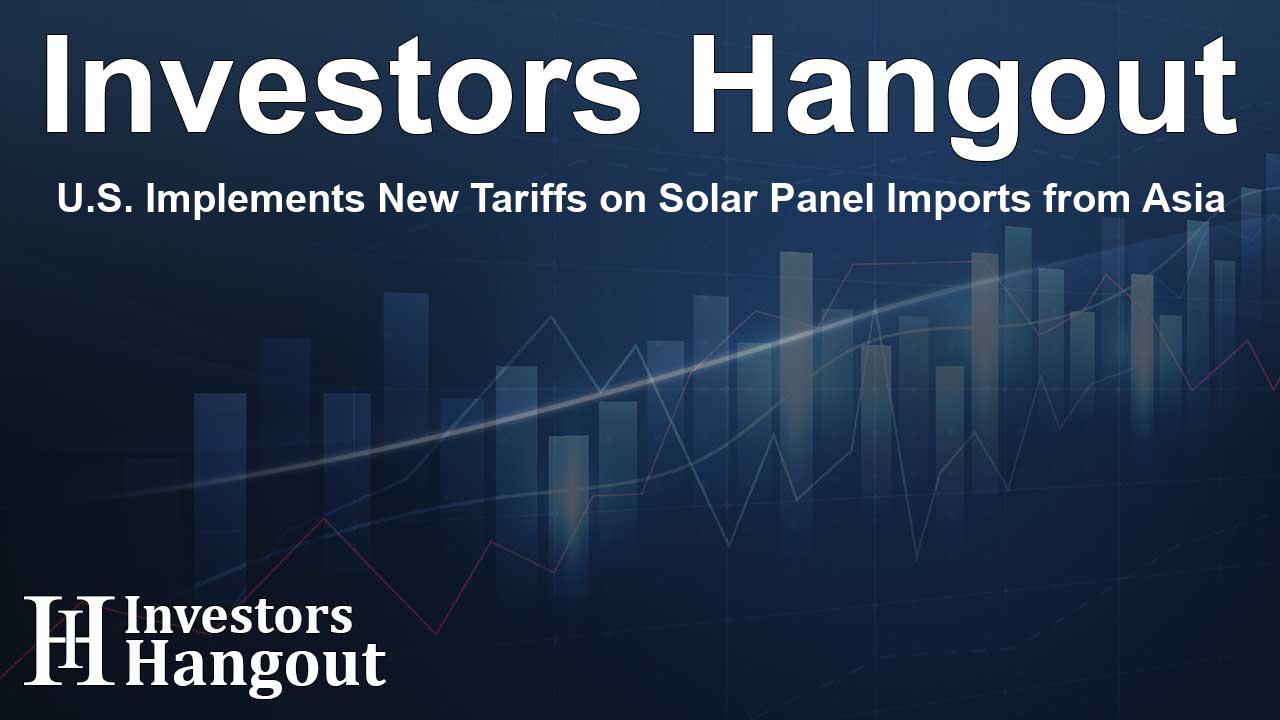U.S. Implements New Tariffs on Solar Panel Imports from Asia

U.S. Commerce Department Announces New Duties on Solar Imports
The U.S. Commerce Department has made significant waves in the solar industry by announcing new anti-subsidy countervailing duties on solar cells imported from several Southeast Asian countries. These countries include Vietnam, Cambodia, Malaysia, and Thailand, and the impact of this decision could reshape the landscape for solar manufacturing.
Details of the Preliminary Tariff Rates
On a preliminary basis, the department has set tariff rates that vary dramatically, ranging from as low as 0.14% to a staggering 3293.61%, depending on the specific company involved. This wide range underscores the complexities of international trade and the differing levels of support received by manufacturers in these countries.
Potential Implications for Solar Companies
This announcement is particularly noteworthy as it marks the first of two preliminary decisions that the Commerce Department will make. The second decision is expected to follow in the coming months. These measures stem from a trade case initiated by Korea's Hanwha Qcells, along with Arizona-based First Solar (NASDAQ: FSLR) and several other contractors who are keen on protecting their substantial investments in U.S. solar manufacturing.
Background on the U.S. Solar Industry
The solar market in the United States has experienced rapid growth over the past decade, with an increasing number of projects aimed at harnessing solar energy. Companies operating in this space have invested billions to establish manufacturing capabilities domestically. However, challenges continue to arise from global market competition, leading to heightened concern over the influx of cheaper imports.
Impact on U.S. Manufacturing and Market Dynamics
As these new duties come into effect, they could create a ripple effect throughout the industry. Domestic manufacturers may find themselves more competitive as imported solar cells become more expensive. However, the situation could also lead to increased costs for solar installers and consumers, potentially slowing down the growth of solar energy adoption.
Looking Ahead: Final Decision and Industry Reactions
A final decision regarding these duties is expected to be announced next year. This timeline will allow businesses and stakeholders in the solar industry to prepare for the potential implications of the tariffs, as the uncertainty could affect commercial planning and investment strategies. The reaction from industry leaders has already indicated a mix of support for protecting U.S. manufacturing and concern regarding the consequences for customers and growth opportunities.
Conclusion: Navigating an Evolving Landscape
As the solar sector continues to evolve, the need for sustainable practices and fair trade remains crucial. Policymakers and industry leaders will have to balance protecting domestic jobs while fostering an environment that supports international cooperation. It will be interesting to witness how this unfolding situation impacts the solar market moving forward and whether the anticipated benefits for U.S. manufacturers offset any challenges faced in the broader market.
Frequently Asked Questions
What are the new duties imposed by the U.S. Department of Commerce?
The U.S. Commerce Department has announced anti-subsidy countervailing duties on solar cells imported from Vietnam, Cambodia, Malaysia, and Thailand, with rates varying significantly.
Why were these duties introduced?
The duties were introduced in response to a trade case initiated by Hanwha Qcells and First Solar to protect U.S. solar manufacturing investments from foreign competition.
What are the tariff rates set by the Commerce Department?
The tariff rates set range from as low as 0.14% to as high as 3293.61%, depending on the specific companies involved.
What is the timeline for the final decision on these duties?
A final decision regarding the duties is expected to be announced next year, following this preliminary announcement.
How might these duties impact the solar industry in the U.S.?
The duties could make domestic manufacturers more competitive but may also lead to increased costs for solar installers and consumers, potentially affecting the growth of solar energy adoption.
About Investors Hangout
Investors Hangout is a leading online stock forum for financial discussion and learning, offering a wide range of free tools and resources. It draws in traders of all levels, who exchange market knowledge, investigate trading tactics, and keep an eye on industry developments in real time. Featuring financial articles, stock message boards, quotes, charts, company profiles, and live news updates. Through cooperative learning and a wealth of informational resources, it helps users from novices creating their first portfolios to experts honing their techniques. Join Investors Hangout today: https://investorshangout.com/
Disclaimer: The content of this article is solely for general informational purposes only; it does not represent legal, financial, or investment advice. Investors Hangout does not offer financial advice; the author is not a licensed financial advisor. Consult a qualified advisor before making any financial or investment decisions based on this article. The author's interpretation of publicly available data shapes the opinions presented here; as a result, they should not be taken as advice to purchase, sell, or hold any securities mentioned or any other investments. The author does not guarantee the accuracy, completeness, or timeliness of any material, providing it "as is." Information and market conditions may change; past performance is not indicative of future outcomes. If any of the material offered here is inaccurate, please contact us for corrections.